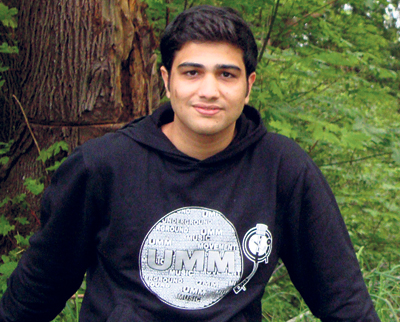My current research interests lie broadly in the area of Algorithms, Social Networks and Game Theory. In my first year at Cornell, I have worked primarily on Algorithmic Game Theory, with a special focus on Sponsored Search and Auction Theory. I love to analyze day-to-day scenarios from a game-theoretic perspective - even applying those notions in card games, board games and restaurant orders (much to the delight, sometimes chagrin, of my friends). I am also quite captivated by the application of graph theory in social-network analyses, viz. designing recommendation systems, studying epidemic models, understanding social relationships better, etc. Recently, I have also garnered interest in scalable database design and data privacy.
RESEARCH INTERESTS
PUBLICATIONS
- The H-coloring of bounded degree digraphs [Working Paper] Pavol Hell, Aurosish Mishra
- Sponsored search with broad match: A hierarchical approach [Submitted to WINE'12] Aurosish Mishra, Eva Tardos
- Wireless localization with vertex guards[pdf] Aurosish Mishra, Tobias Christ EuroCG, Morschach, Switzerland, 2011
- A Novel Approach to Swarm Bot Architecture[pdf] Vinay Pilania, Shaunak Mishra, Subrat Panda, Aurosish Mishra International Asia Conference on Informatics in Control, Automation and Robotics, Bangkok, Thailand, 2009
- A Spatio-Temporal Simulation Framework for Group Behaviour Analysis of Mobile Phone Users [Masters Thesis, 2011] [pdf]
- Fault Tolerant Analysis of Automative Systems [Bachelors Thesis, 2010] [pdf]
PROJECTS
1. Analyzing the Schelling Segregation Model
This project is an attempt to perform a rigorous analysis of the segregation model proposed by Thomas Schelling in 1973. In his work, Schelling suggested that local segregation preferences will lead to global segregation. We look at the 1-D Schelling model and try to understand the behaviour of the system dynamics with varying levels of local preferences. Status: Ongoing (joint work with Bruno Abrahao, Prof. Robert Kleinberg)
2. Collaborating to Compete: Strategic Gameplay in Social Networks
In this project, we explore games having both collaborative and competitive elements with a motivating example: researchers competing to have their papers accepted in prestigious conferences. We use the concept of contractual stability developed in cooperative game theory, and derive Price of Anarchy-like bounds for a class of games with superadditive utilities for coalitions and fair sharing of utilities among individuals in a coalition. Status: Ongoing (joint work with Adith Swaminathan)
3. Sponsored Search with Broad Match
In this project, we studied the effect of broad match keywords on sponsored search. Each of the keywords has a homogeneous packaging of search terms with respect to advertiser valuations. Assuming a laminar hierarchy of keywords, we obtained an improved Price of Anarchy bound which depends linearly on the homogeneity parameter. Status: Submitted to WINE 2012 (joint work with Prof. Eva Tardos)
INTERNSHIPS
1. Simon Fraser University, Burnaby, Canada, 2010
The H-coloring problem for bounded degree digraphs
H-coloring problems for digraphs are either polynomial or NP-complete depending on the degree bounds. We investigate this dichotomy of H-coloring for bounded degree digraphs and provide a neat characterization of the problem by focusing on the two smallest digraphs with NP-complete general H-colorability problems. Status: Manuscript under preparation (joint work with Prof. Pavol Hell)
2. CADMO, ETH, Zurich, 2009
Wireless Localization with vertex guards
In this project, we worked on Wireless Localization restricted to vertex guards. Given a simple polygon P, the problem involves placing guards, each broadcasting a unique key within a fixed angular range, on the polygon vertices, such that we can classify any point as inside or outside P based on the keys received. We obtained improved sub-linear bounds on the number of guards. Status: Published in EuroCG 2011(joint work with Tobias Christ, Michael Hoffmann)
3. SPANN Lab, Indian Institute of Technology, Bombay, 2008
Smart Parking System
This project involved developing a user-friendly and adaptable "Smart Parking System" in order to alleviate parking hassles in large multi-level parking garages. The design involved placing magnetic sensors in the parking lots that would detect vehicles and communicate with a central base station, which in turn, would update the parking lot guidance system. Status: Demo given in SPANN Lab (joint work with Prof. Uday Desai)
